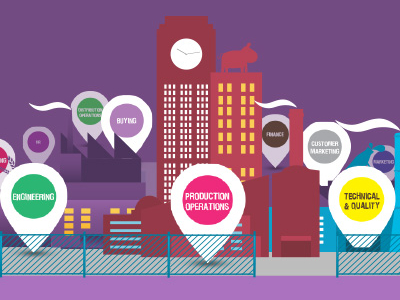What’s it all about then?
As a Warehouse Manager working in the food or drink manufacturing sector, you’ll play an important role in your company’s supply chain and be responsible for managing people, processes and systems.
You’ll oversee the efficient receipt, storage and despatch of raw materials and products and lead a team of warehouse operatives responsible for product lines that run into the many thousands of individual components which all have to be stored, recorded and kept ready for despatch or use in line with company targets and schedules.
You’ll also be responsible for the health and safety of anyone working or visiting the warehouse and the security of all food product stocks as well as the building itself. As you will be dealing with food storage, this could mean certain warehouse areas might be temperature-controlled. The reliability and smooth running of the equipment that controls temperature is vital, so plant maintenance could also fall under your remit.
What might I be doing?
Your work activities will depend on the size of the food company that you work for and generally, the larger the company the more strategic the role. In a large company, expect more planning, coordinating and administrating. In a smaller company, you may well retain more of a hands-on role.
In either case, your work is likely to include:
- Working closely with suppliers, customers and distributors
- Planning delivery and dispatch of materials and products
- Ensuring Health & Safety rules are followed at all times
- Ensuring all stock is accurately recorded and rotated
- Liaising with production and planning staff
- Leading and managing a team of warehouse staff - including their recruitment, appraisal and training
- Ensuring all equipment is properly maintained
- Making sure stock is properly stored
- Ensuring all material is available when necessary
- Ensuring all agreed targets are achieved
- Recommending and implementing system upgrades and improvements in line with budgets
- Making sure all space is utilised effectively and reducing wastage
- Monitoring service levels
What will be expected of me?
You’ll be a well-organised person who remains cool under pressure and able to meet tight deadlines. You are a decisive kind of person quick to solve problems and able to work with people at all levels including external customers.
As warehouse manager you will be expected to be a good leader able to motivate a team of staff and make sure everyone is working to the best of their ability
Good communication and written English skills are vital along a good understanding of financial issues and good computer skills as you’ll be using spreadsheets in the course of your work.
What can I expect?
Your hours will probably be based around a 40-hour week with a shift element depending on the needs of the job. Shift-based working is common in many food manufacturing companies and warehouses have to be open and available to accept of despatch goods when needed as dictated by production, supply or client needs– you could be expected to manage shift workers as well.
As the warehouse manager you will be mainly office based though you will spend time in the warehouse to keep on top of everything that is happening. During particularly busy periods, such as auditing and stocktaking, you may have to work longer hours than normal and you may also be expected to travel to visit customers and suppliers from time to time to discuss warehouse and logistics needs.
What qualifications do I need to get in?
You may start out as a graduate trainee with your company, in which case you’re likely to have a food or business-related degree – some employers will take other subjects depending on how you impressed them during the selection process.
Of course, entry without a degree or foundation degree is also possible and industry experience is still a very important factor in recruitment.
In most cases, a postgraduate qualification is not an entry requirement but a relevant Masters degree might help give you the edge with some employers.
What about further training?
Training varies from company to company. If you’re a graduate in a large food or drink manufacturing company you’ll often have the opportunity of development through a range of schemes to help further develop personal skills such as team-working and negotiation - normally through in-house training courses.
Of course outside formal graduate training schemes, many new entrants learn on the job under the supervision of experienced supervisors and managers.
If you’re interested in further qualifications then you could select a postgraduate course from a wide range of management qualifications that will also help with your career development. They are widely available at local universities and usually part time in nature.
You might also consider membership of a professional institute such as Chartered Institute of Logistics and Transportation.
Anything else I might need to know?
Yes, warehouse management provides a clear pathway to promotion through to a broader role in supply chain management so think about this when you’re making a career choice.
 cy
cy





